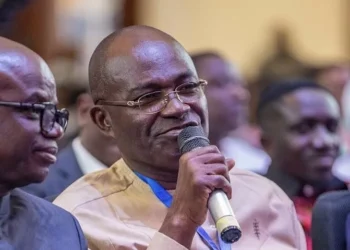Eric Opoku, the Ranking Member of the Food, Agriculture and Cocoa Affairs Committee of Parliament, has critiqued the management of the Ghana Cocoa Board (COCOBOD), following the latter’s response to former President John Dramani Mahama’s comment on the cocoa sector.
Ernest Opoku described COCOBOD’s response as a misrepresentation intended to whitewash the dismal performance of the Akufo-Addo administration.
Former President John Dramani Mahama claimed that the country’s cocoa sector is on the verge of collapse because of the mismanagement of the sector by the Akufo-Addo government.
However, COCOBOD in an April 27 statement, refuted the claims saying they are misleading and detrimental to a vital sector like cocoa.
Ernest Opoku, responding to COCOBOD’s statement, claimed “It is an incontrovertible truism and COCOBOD’s response is nothing but a misrepresentation intended to whitewash the dismal performance of the Nana Addo/Bawumia government. We aver that COCOBOD under Nana Addo/Bawumia government is a whitewashed tomb – pretty on the outside but full of decay and rottenness on the inside. Former President John Dramani Mahama has been very candid to the good people of Ghana in his political life. His comments on the cocoa sector were fair and candid.”
COCOBOD Refutes Mahama’s Statement On Cocoa Prices And The Sector
The Ghana Cocoa Board (COCOBOD) responded to former President John Dramani Mahama’s recent comments about the cocoa sector in the country. According to COCOBOD management, the statement made by Mahama about cocoa prices during his administration was inaccurate, and the records available, prove the opposite.

Mahama had accused the Akufo-Addo-led government of destroying the cocoa sector, stating that cocoa farmers used to be paid instantly, whenever they sold their cocoa. However, he said, it now takes farmers three months to receive their cash. Additionally, farmers no longer receive free fertilizer, which negatively impacts the cocoa business.
The former president further claimed that during his administration, cocoa prices were adjusted annually. However, the COCOBOD management stated that there was no upward adjustment of the producer price of cocoa in the 2012/2013 crop season. Similarly, the producer price of the preceding season was maintained for the 2015/2016 crop season with no upward adjustment.
Moreover, the management also highlighted that within a three-year period of the former president’s administration (2010/2011 to 2012/2013 crop season), there was a total of 6% increase in the producer price. In contrast, within the last three years, there has been a 23%, 0%, and 21% increase in the producer price of cocoa.
The COCOBOD management emphasized that the producer price is largely determined by international market prices, and every effort is made to arrive at a producer price that is fair to farmers, even when international market conditions are unfavorable. The statement also reassured the public that the cocoa industry is not collapsing, as Ghana recorded its highest-ever cocoa production volume of one million and forty-five thousand five hundred metric tonnes (1,045,500) in the 2020/21 crop season.
COCOBOD continues to invest in interventions to sustain and grow the industry, including the Hand Pollination Programme, Mass Pruning Programme, and Cocoa Rehabilitation Programme. These programs seek to enhance pests and disease control, induce flowering, and deal with the Cocoa Swollen Shoot virus disease that has ravaged about 45% of the cocoa tree stock.
READ ALSO: Apaak Suggests Frimpong-Boateng’s Report Be Probed Thoroughly






















